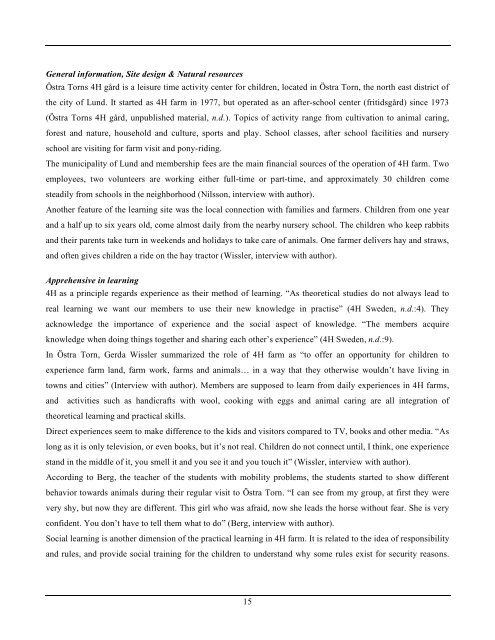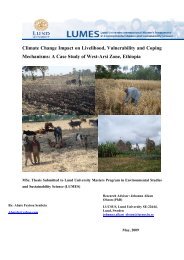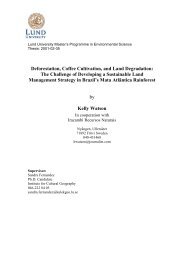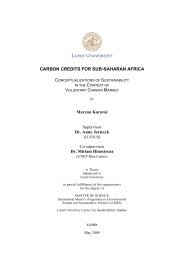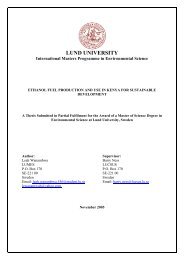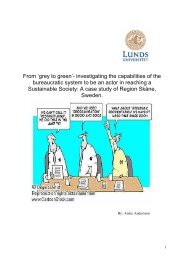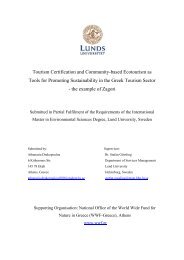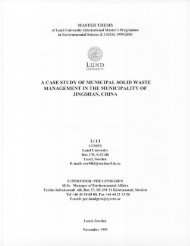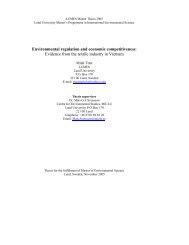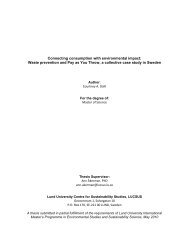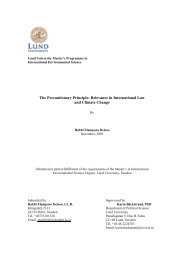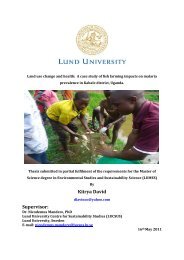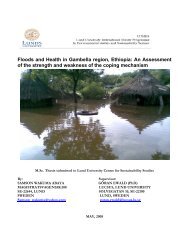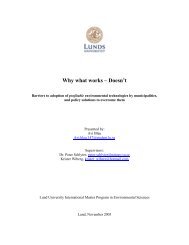Principles and Practices of 4H and Permaculture - lumes
Principles and Practices of 4H and Permaculture - lumes
Principles and Practices of 4H and Permaculture - lumes
You also want an ePaper? Increase the reach of your titles
YUMPU automatically turns print PDFs into web optimized ePapers that Google loves.
General information, Site design & Natural resourcesÖstra Torns <strong>4H</strong> gård is a leisure time activity center for children, located in Östra Torn, the north east district <strong>of</strong>the city <strong>of</strong> Lund. It started as <strong>4H</strong> farm in 1977, but operated as an after-school center (fritidsgård) since 1973(Östra Torns <strong>4H</strong> gård, unpublished material, n.d.). Topics <strong>of</strong> activity range from cultivation to animal caring,forest <strong>and</strong> nature, household <strong>and</strong> culture, sports <strong>and</strong> play. School classes, after school facilities <strong>and</strong> nurseryschool are visiting for farm visit <strong>and</strong> pony-riding.The municipality <strong>of</strong> Lund <strong>and</strong> membership fees are the main financial sources <strong>of</strong> the operation <strong>of</strong> <strong>4H</strong> farm. Twoemployees, two volunteers are working either full-time or part-time, <strong>and</strong> approximately 30 children comesteadily from schools in the neighborhood (Nilsson, interview with author).Another feature <strong>of</strong> the learning site was the local connection with families <strong>and</strong> farmers. Children from one year<strong>and</strong> a half up to six years old, come almost daily from the nearby nursery school. The children who keep rabbits<strong>and</strong> their parents take turn in weekends <strong>and</strong> holidays to take care <strong>of</strong> animals. One farmer delivers hay <strong>and</strong> straws,<strong>and</strong> <strong>of</strong>ten gives children a ride on the hay tractor (Wissler, interview with author).Apprehensive in learning<strong>4H</strong> as a principle regards experience as their method <strong>of</strong> learning. “As theoretical studies do not always lead toreal learning we want our members to use their new knowledge in practise” (<strong>4H</strong> Sweden, n.d.:4). Theyacknowledge the importance <strong>of</strong> experience <strong>and</strong> the social aspect <strong>of</strong> knowledge. “The members acquireknowledge when doing things together <strong>and</strong> sharing each other’s experience” (<strong>4H</strong> Sweden, n.d.:9).In Östra Torn, Gerda Wissler summarized the role <strong>of</strong> <strong>4H</strong> farm as “to <strong>of</strong>fer an opportunity for children toexperience farm l<strong>and</strong>, farm work, farms <strong>and</strong> animals… in a way that they otherwise wouldn’t have living intowns <strong>and</strong> cities” (Interview with author). Members are supposed to learn from daily experiences in <strong>4H</strong> farms,<strong>and</strong> activities such as h<strong>and</strong>icrafts with wool, cooking with eggs <strong>and</strong> animal caring are all integration <strong>of</strong>theoretical learning <strong>and</strong> practical skills.Direct experiences seem to make difference to the kids <strong>and</strong> visitors compared to TV, books <strong>and</strong> other media. “Aslong as it is only television, or even books, but it’s not real. Children do not connect until, I think, one experiencest<strong>and</strong> in the middle <strong>of</strong> it, you smell it <strong>and</strong> you see it <strong>and</strong> you touch it” (Wissler, interview with author).According to Berg, the teacher <strong>of</strong> the students with mobility problems, the students started to show differentbehavior towards animals during their regular visit to Östra Torn. “I can see from my group, at first they werevery shy, but now they are different. This girl who was afraid, now she leads the horse without fear. She is veryconfident. You don’t have to tell them what to do” (Berg, interview with author).Social learning is another dimension <strong>of</strong> the practical learning in <strong>4H</strong> farm. It is related to the idea <strong>of</strong> responsibility<strong>and</strong> rules, <strong>and</strong> provide social training for the children to underst<strong>and</strong> why some rules exist for security reasons.15


